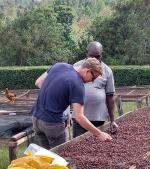Rising incomes and growing interest in high-quality coffees bring interesting opportunities to the Eastern European coffee market. Multinational companies and mainstream brands currently dominate the market in this region, but specialised small coffee roasters are rapidly emerging, especially in Poland, the Czech Republic and Romania. The specialty market is still a very small niche market, but it opens doors for exporters of high-quality coffees and the establishment of more direct relationships with buyers.
The Scandinavian market offers many opportunities for producing country suppliers. The Scandinavian market is not the largest, but it values quality and sustainable sourcing. This market therefore offers special opportunities to certified suppliers and suppliers of premium and specialty coffee. Five larger roasters dominate the Scandinavian market.
Exporting specialty coffee to Europe comes with strict rules about quality, labels and sustainability. To succeed, exporters need to understand different market segments and how to sell their coffee. Creating a good relationship with your buyers is of key importance. You need this to establish trust and a long-term trading relationship. Many European buyers will have their own quality requirements. This creates opportunities to diversify and appeal to European importers and roasters.
Search
Enter search terms to find market research
Exporting specialty coffee to Europe requires a lot of hard work and knowledge. To help you prepare CBI provides market information with trends which offer opportunities in the European market for exporting specialty coffee. From information about buyer requirements and certifications when exporting specialty coffee, to main market segments and distribution channels for exporting specialty coffee as well as information about the competition.
Belgian chocolate is famous the world over. It is produced under strict requirements and is a major export product for Belgium. With its large chocolate industry, Belgium is a major hub for cocoa bean imports from producing countries. Most of its chocolate is produced by three manufacturers: Barry Callebaut, Cargill and Puratos. These three companies dominate the chocolate supply. Sustainability is very important in Belgium, and a large share of the market already buys certified cocoa. This share is expected to keep growing.
Adventure tourism in Europe requires a lot of hard work and knowledge. To help you prepare CBI provides a Market Potential study with a list of European countries that offer the most opportunities for adventure tourism and it describes the trends that offer new opportunities. The Market Entry study on this page contains information about buyer requirements and certifications, main market segments and distribution channels as well as information about the competition.
Cruise tourism in Europe requires a lot of hard work and knowledge. To help you prepare CBI provides a Market Potential study with a list of European countries that offer the most opportunities for cruise tourism and it describes the trends that offer new opportunities. The Market Entry study on this page contains information about buyer requirements and certifications, main market segments and distribution channels as well as information about the competition.
Grains, pulses and oilseeds are often used in healthy snacks. Their nutritional value is positively received by health conscious consumers. As an exporter, you can target the market for specific ingredients, specialise in processing ingredients or consumer products. The further you develop your supply chain, the higher will be your investment and your responsibility in food safety and information to consumers.
Currently, the European market for fonio is in its early stages of development and still niche. Therefore, marketing fonio as a specialty grain offers the most opportunities for this product. In this market, it will compete with other nutritious, gluten-free grains, such as quinoa, amaranth and teff. There could be an interesting future for fonio in Europe with the right marketing efforts and reliable supply.
Common beans such as kidney beans and white pea beans are a traditional food common in many cuisines in different cultures. You will find most demand for these products from bean packers and the canning industry, while new convenience and healthy bean products are slowly emerging. These new products generate buyers’ interest in new supplying sources, but you must be able to deal with increasing product standards and strong competition from well-established producing countries.
